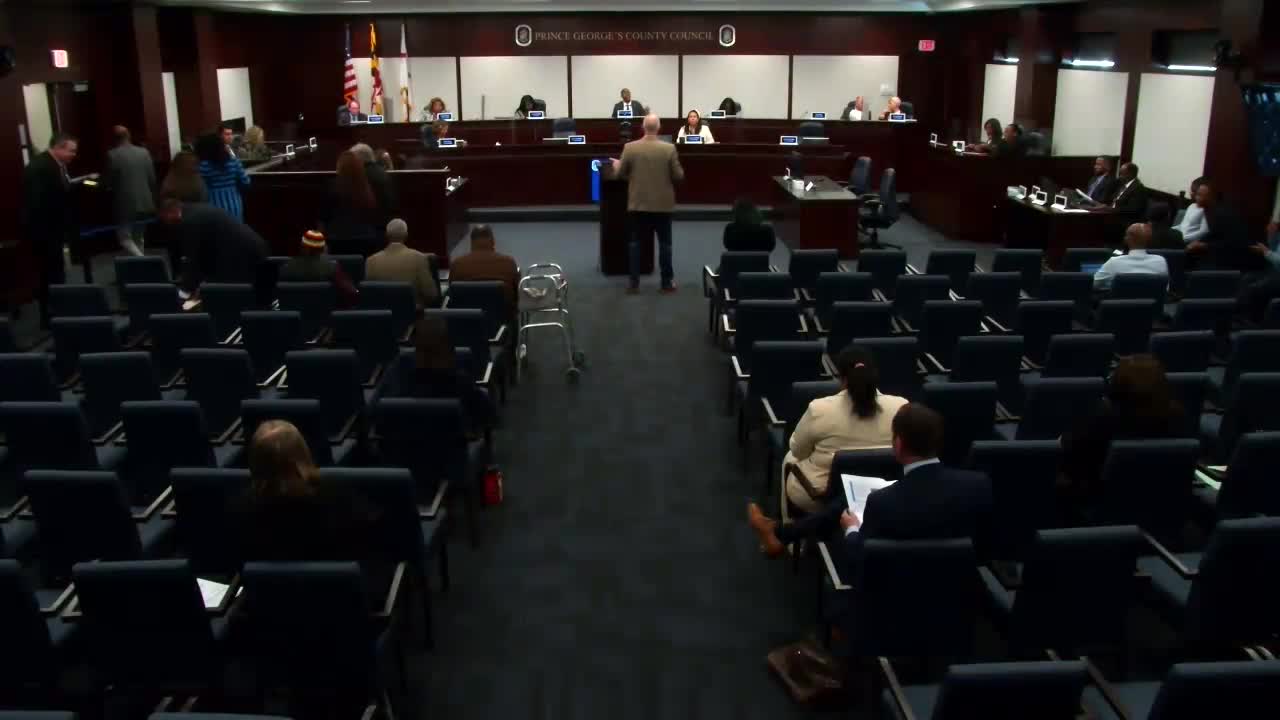MAKO and COG brief Prince George's County Council on state fiscal outlook, housing, data centers and regional planning
Get AI-powered insights, summaries, and transcripts
Subscribe
Summary
MAKO and the Metropolitan Washington Council of Governments briefed the Prince George's County Council on Oct. 28 about state fiscal pressures, housing and transportation priorities, and regional concerns including data centers, energy demand and federal‑workforce impacts.
Representatives from the Maryland Association of Counties (MAKO) and the Metropolitan Washington Council of Governments (COG) briefed the Prince George’s County Council on Oct. 28, presenting state fiscal context, housing and transportation priorities, data‑center and energy issues, and regional programs that affect the county.
Jack Wilson, MAKO president, and Michael Sanderson, MAKO executive director, told the council that Maryland faced significant fiscal strain after the prior legislative session and that the state’s April budget actions were designed to bridge a multi‑year gap. Sanderson told the council the state’s general‑fund budget is roughly $25–$26 billion and that about $3 billion of adjustments were made to stabilize finances. He said the state had shifted some costs to counties, for example sharing spikes in teacher pension costs between state and counties, which has contributed to local budget pressure.
Sanderson highlighted the state’s 10‑year education blueprint and warned that some costs tied to that plan could land on the state’s general fund in fiscal year 2028. He discussed transportation funding and the long‑standing issue that counties do not control local gas tax revenue and are still operating at lower highway‑user distributions than before 2009. Sanderson said housing and energy policy — particularly the growth of data centers and their large electricity and water demands — were likely to be focal issues in the next legislative session.
Council members asked MAKO to help convene jurisdictions on accessory‑dwelling‑unit (ADU) implementation and to assemble best practices on data centers and governance. Sanderson said MAKO would facilitate information sharing and noted a three‑part series on data centers planned for early 2026 focused on water use, electrical demand, and financial considerations.
Clark Mercer, executive director of the Metropolitan Washington Council of Governments, described COG’s work on regional planning and services. Mercer outlined COG programs that have direct impact in Prince George’s County: the Transportation Planning Board (TPB), regional procurement cooperatives, mutual aid agreements for public safety, a regional real‑time crime dashboard, housing and anti‑homelessness counts, and regional economic development planning. Mercer said TPB recently declined to include a Virginia proposal to extend toll lanes across the Wilson Bridge into the long‑term plan; he thanked council member Olson for advocacy on a related local matter.
Mercer highlighted regional data the council may find relevant: COG and its partners estimate the National Capital Region will add about 1.4 million people and 1 million jobs by 2050; Prince George’s County’s population was listed at about 998,000 in 2025 and forecast to reach about 1,190,000 by 2050. He also briefed the council on federal‑workforce data: COG reported roughly 65,000 federal workers live in Prince George’s County (about 17% of the county workforce) and that the average federal worker in the county earns about $110,000 compared with a countywide average wage of about $66,000.
Council members raised practical questions about data‑center standards, regional coordination to avoid “jurisdiction shopping,” the potential for state preemption of zoning for large users, and energy‑policy responses (including whether PJM participation or market structure should be reconsidered). MAKO and COG representatives said they would help convene jurisdictions, assemble best practices, and make technical assistance and convening support available.
Both MAKO and COG offered concrete resources to Prince George’s County: technical‑assistance grants, procurement cooperatives that save the county money on fuel and equipment, planning and housing grants, and upcoming events and working groups (including a DMV‑Moves transit initiative and a regionwide talent/job matching service). Council members signaled interest in continuing to work with MAKO and COG on ADU implementation, data‑center policy, transit coordination and workforce initiatives.
The presentations were given as part of the council’s briefings section; council members asked questions and the meetings concluded without votes on the briefing content.
